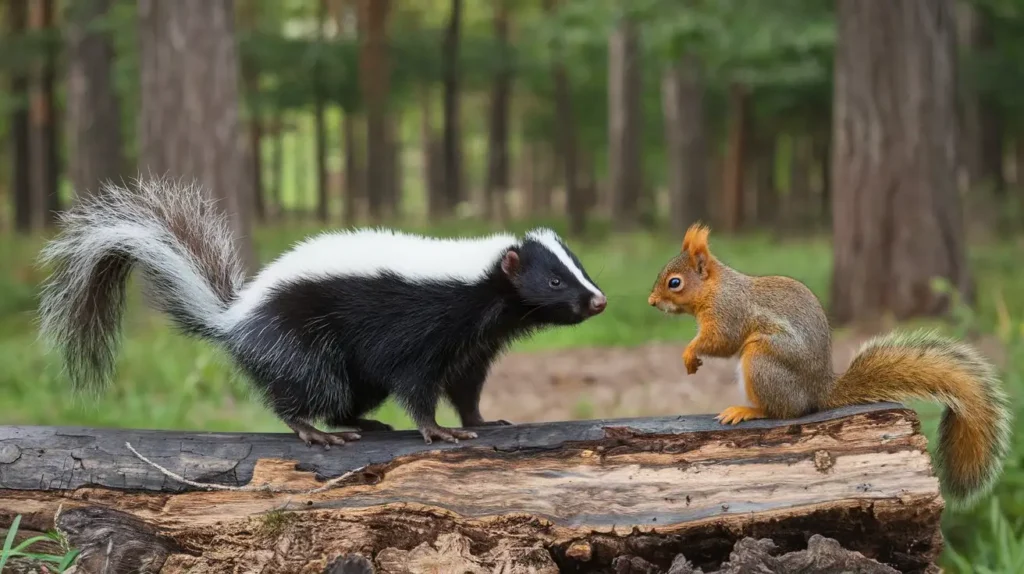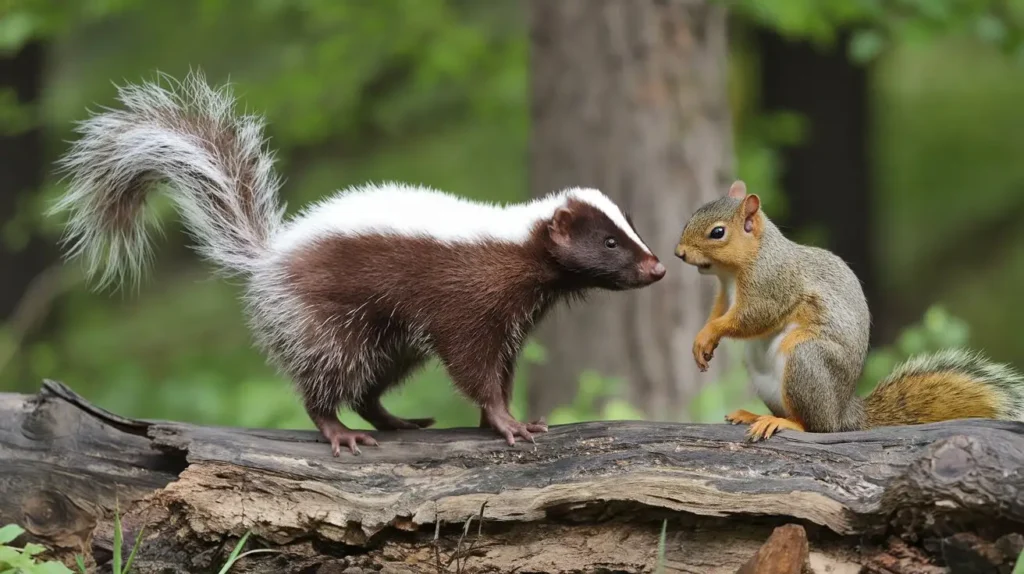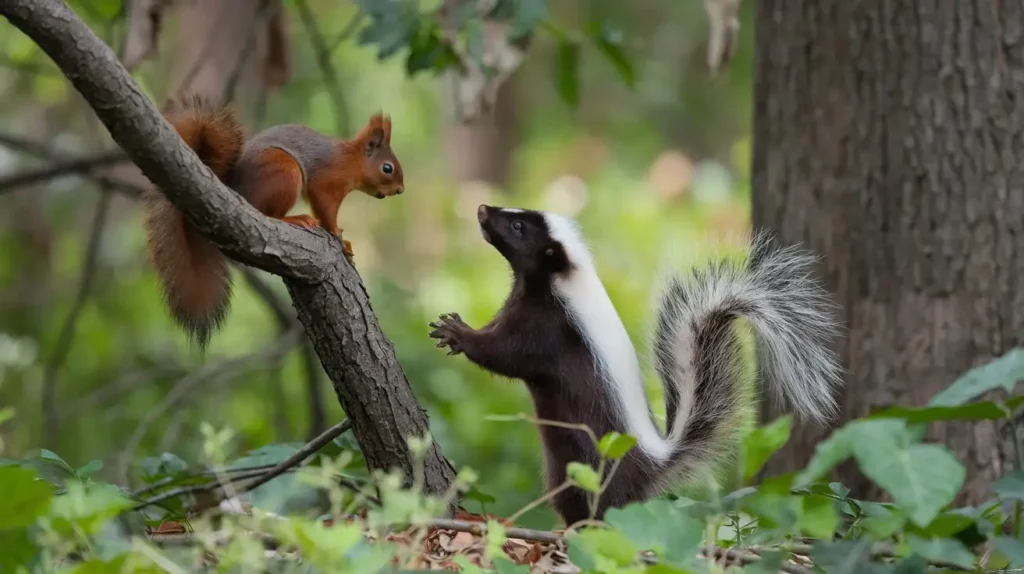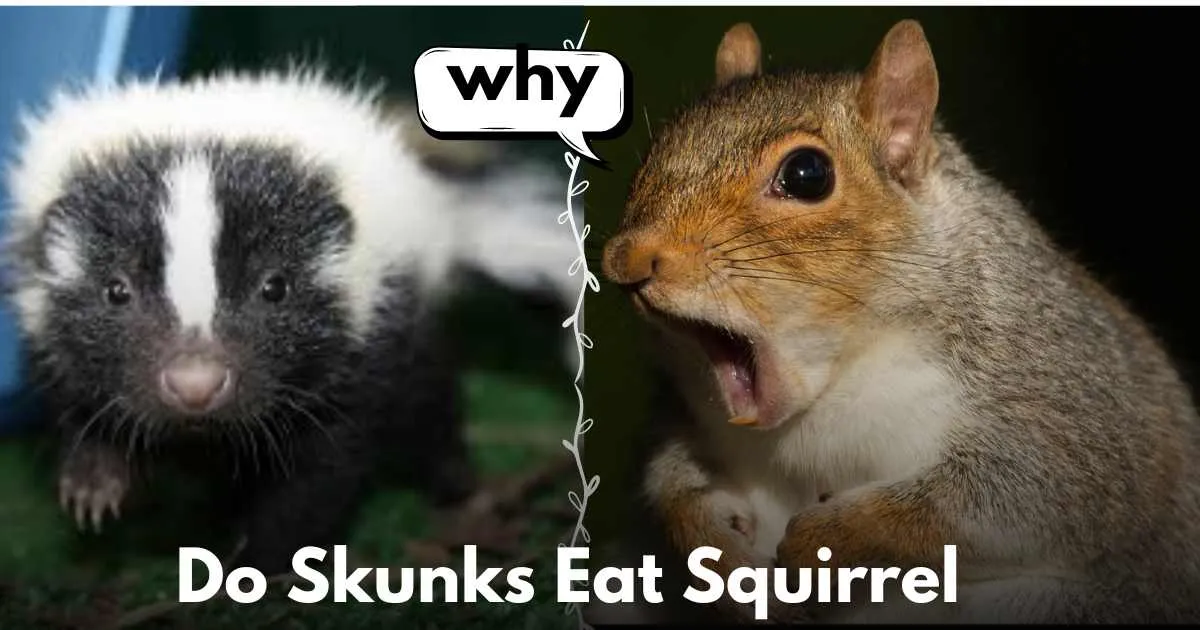Can Skunks Eat Squirrels?
Last updated on November 4th, 2024 at 05:05 am
You might be surprised to learn that while skunks usually snack on bugs and worms, they aren’t great at catching quick animals like squirrels. As a skunk pet owner and wildlife enthusiast, I’ve found that skunks are more likely to raid a squirrel’s nest for eggs than chase them up trees. Keep reading to learn more about these fascinating creatures and their eating habits!
Skunk Diets
The diet of a skunk is diverse and intriguing. Often misunderstood, these creatures have a varied palette that helps them thrive in many environments. Their food choices range from plant-based delicacies to opportunistic feasting on small animals. A common question arises: Do skunks eat squirrels? While not a staple in their diet, skunks are omnivores and may prey on small mammals when the opportunity presents. Let’s delve into what typically comprises a skunk’s meal.
Common Foods In A Skunk’s Meal Plan
- Insects: A large portion of their diet consists of pesky bugs.
- Small rodents: Mice and voles often fall prey to skunks.
- Fruits and berries: Skunks enjoy these sweet treats in season.
- Plants: They munch on leaves and roots.
- Eggs: Skunks will raid nests for a protein boost.
- Amphibians & reptiles: These are occasional snacks.
While not common, a skunk can eat a squirrel if it catches one. Skunks are not known for being great hunters, so they often eat what is available easily.

Foraging Tactics Of Skunks
Skunks are primarily nocturnal foragers. They use their keen sense of smell to locate food. A skunk pokes its nose into soil and leaf litter to uncover hidden meals. They will flip rocks and logs with their strong front claws to find insects, worms, and other small invertebrates.
| Action | Food Source |
|---|---|
| Rooting | Insect larvae and grubs |
| Digging | Small rodents and ground-nesting eggs |
| Foraging | Fruits, nuts, and plants |
Skunks are adaptable and their diet changes with the seasons. During winter, their ability to store fat allows them to survive on less food. They slow down and eat less, but a warm spell might prompt them to emerge and forage.
In summary, while not typical predators of squirrels, skunks have an appetite that accommodates a variety of foods, including small mammals when available. Their foraging tactics make them versatile survivors, able to adapt to their environments with ease.
Understanding Skunks
Many might think of skunks as just stripey creatures with a stinky defense mechanism.
But there’s much more to these animals than their notorious scent.
Could these mammals be predators to agile squirrels? Let’s dive into what makes skunks unique.
Physical Characteristics And Habits
Skunks are known for their distinctive black-and-white coloring, which serves as a warning to potential predators. They carry a powerful defense mechanism — a foul-smelling spray that can deter any threat. Skunks have relatively short legs and long bodies, which makes them less agile compared to squirrels.
- Size: They range from 15 to 35 inches long, including their bushy tails.
- Diet: Skunks are omnivores, eating plants, insects, and small animals.
- Behavior: They are nocturnal and typically solitary, except during mating season.
- Skunk Species Variations
There are several species of skunks, each with unique traits. Four main species exist in the Americas: the striped skunk, spotted skunk, hooded skunk, and hog-nosed skunk.
| Species | Color Patterns | Habitat |
|---|---|---|
| Striped Skunk | Two white stripes | Woods, grasslands, urban areas |
| Spotted Skunk | White spots and broken stripes | Shrubby areas, open lands |
| Hooded Skunk | One wide white stripe | Desert, foothills, forest edges |
| Hog-nosed Skunk | Single broad white stripe, elongated nose | Desert, brush, open areas |
While all can spray their odorous liquid, each has its style and precision. Some can target from up to ten feet away. In terms of diet, they are not fussy eaters. However, skunks rarely attack animals like squirrels, unless by surprise or if other food is scarce.
Squirrels: A Potential Prey?
Imagine a quiet forest where a peaceful squirrel scampers. The woods are full of life, but is there danger lurking? We often see squirrels as nimble creatures, but do they ever become a meal for other forest dwellers, like skunks?
Squirrels In The Wild
Squirrels are common in forests, parks, and urban areas. They mostly eat nuts, seeds, and plants. But do skunks prey on these agile rodents? Skunks are omnivores, which means they eat both plants and animals.
Skunks have a varied diet and may consider squirrels as food. But squirrels are swift and alert. They spend much time in trees where skunks, who are not skilled climbers, can’t easily reach them.
- Skunks primarily eat insects, grubs, and small mammals.
- Squirrels are active mainly during the day, while skunks are nocturnal.
- During overlap in active hours, squirrels must stay vigilant.
Defensive Mechanisms Of Squirrels Against Predators
Squirrels have developed defensive strategies to survive. They are fast and agile, making it hard for predators like skunks to catch them.
| Defensive Mechanism | Description |
|---|---|
| Agility | Quick movements and jumping skills help escape. |
| Vigilance | They constantly watch for danger while eating or playing. |
| Tree Dwelling | Living high in trees provides safety from many predators. |
| Deceptive Tactics | They may pretend to bury nuts to mislead predators. |
Survival is key in the wild, and squirrels are masters at it. Though they might be on the menu for some predators, their survival skills often lead them to safety.
The Predatory Instincts Of Skunks
Many might picture the humble skunk as little more than a passive creature, famed mostly for its defensive, pungent spray. Yet, skunks possess inherent predatory instincts that play a role in their survival in the wild. While squirrels aren’t the main item on the menu, understanding the hunting practices of skunks can be enlightening.

Hunting Strategies
Sneaky by nature, skunks employ various tactics to capture their prey. They hunt primarily by scent and sound due to their poor eyesight. Night time is when they actively search for meals. Using their sharp claws, they dig into the habitats of smaller animals and insects.
- Skunks perform a methodical search for food under cover of darkness.
- They rely on their acute sense of smell to locate potential prey.
- Surprise and quick action aid them in catching unsuspecting animals.
Skunks’ Food Preferences And Opportunistic Nature
Skunks are not picky eaters. Their diet is mostly made up of insects and small rodents. Opportunistic feeding is a key survival strategy for skunks. This means they eat what’s available, focusing on ease of capture.
The question arises: Do skunks eat squirrels? As omnivores, skunks might take the chance to snatch a squirrel if the opportunity presents itself, especially young or weak individuals. However, this is not a regular occurrence, and squirrels are not a preferred choice.
| Preferred Prey | Occasional Prey |
|---|---|
| InsectsWormsSmall rodents | Squirrels (rarely)Bird eggsFruits |
With their opportunistic diet, a skunk’s meal plan adjusts based on availability. Easy-to-catch and abundant food sources like insects and grubs typically compose their primary fare, with other small animals only when convenient.
Evidence Of Skunks Preying On Squirrels
Evidence of Skunks Preying on Squirrels may seem remarkable. Skunks are omnivores. This means they eat both plants and animals. It raises the question: Do they hunt squirrels? Let’s explore the evidence available.
Documented Cases And Observations
Concrete evidence can solidify this claim. While skunks are not typical predators, some cases provide insight.
- Eye-witness accounts have noted skunks attacking squirrels.
- Trail cameras have captured such rare events.
- Naturalists have documented unusual behaviors in their field notes.
Criteria For Skunks Selecting Prey
Skunks may select prey based on several factors. Notably:
| Criteria | Description |
|---|---|
| Size | Squirrels are small enough for skunks to handle. |
| Availability | Squirrels are common in habitats shared with skunks. |
| Vulnerability | Injured or young squirrels are easier targets. |
| Opportunity | Skunks may prey on squirrels when other food is scarce. |
Alternative Food Sources For Skunks
Many wonder if skunks prey on squirrels, but their diet is quite diverse. Let’s explore other food skunks love.
Insects And Grubs: A Skunk’s Delight
Skunks are not picky eaters. A favorite snack for them includes creepy crawlies. They often dig for insects and grubs, providing a nutritious feast. Let’s look at the bugs skunks munch on:
- Beetles
- Grasshoppers
- Bees and Wasps
- Ants
- Earthworms
These little critters make up a big part of a skunk’s diet. They are perfect for skunks as they provide protein.
Plant Matter And Fruits In A Skunk’s Diet
Fruits and plants are key foods for skunks too. They often eat:
| Fruits | Plants |
|---|---|
| Berries | Grasses |
| Cherries | Leaves |
| Apples | Roots |
Such sweet treats and greens are important for a balanced skunk diet. They offer vitamins and fibers.
Human-skunk Interactions And Misconceptions
Human-Skunk Interactions and Misconceptions often lead to fascinating tales and false beliefs. Skunks, those black and white striped creatures, are infamous for their defensive spray but charming in their own right. People frequently misunderstand their habits and dietary preferences. This section will dispel myths, particularly regarding skunks eating squirrels, and share tips to minimize unwanted skunk visits.
Myths About Skunk Diets
Contrary to popular belief, skunks are not active predators of squirrels. Their diet mainly consists of:
- Insects and larvae
- Small rodents
- Fruits and berries
- Worms and grubs
Skunks prefer easier prey and are opportunistic eaters. They won’t chase a squirrel when there are simpler meals available.
Reducing Skunk Encounters Through Proper Waste Management
Unsecured garbage is a dinner invitation for skunks. To discourage visits:
- Secure trash bins with locking lids.
- Remove pet food from outdoor areas.
- Compost in a sealed container.
Following these steps will make your space less attractive to skunks searching for food.
Wildlife Experts Weigh In
When dusk falls, a skunk’s black-and-white figure is often seen foraging with purpose. Skunks are known for their pungent defense mechanism. Yet many wonder about their place in the food chain. Do these nocturnal creatures count squirrels among their prey? Let’s dive into insights from field experts.
Expert Opinions On Skunk Predation
Skunks have a varied diet, and expert observations reveal fascinating details. Typically, skunks prefer an omnivorous diet. This means they eat both plants and small animals. Dr. Smith, a renowned wildlife biologist, confirms, “Skunks are not aggressive predators. They tend to eat what is available with ease.”
Insects and larvae make up the bulk of their diet. When opportunities arise, they may go for small mammals. Squirrels, which are swift and arboreal, are not usual skunk targets. Dr. Jones, a specialist in mammal behavior, notes, “Squirrels, gifted in evading predators, are not a common food choice for skunks.”
Conservationists’ Perspective On Skunk Diets
Conservationists emphasize the importance of understanding animal diets. It helps maintain ecological balance. They point out that skunks play a role in controlling insect populations. This suggests that skunks focus on more accessible food sources.
As animals that stay close to the ground, skunks often opt for grubs, rodents, and fallen fruits. According to Rachel Greene from Wildlife Haven, “Skunks contribute to a thriving ecosystem by keeping certain pest populations in check.”
While seldom documented, cases of skunks eating squirrels are not impossible. Greene adds, “Skunks might scavenge on squirrel carcasses but hunting them is less likely.”
In summary, while diverse, a skunk’s palate usually doesn’t include squirrels as a significant component. This connects back to the broader conversation about the value of wildlife understanding.
Protecting Squirrel Populations
Do skunks eat squirrels? This question often surprises many. Our fluffy-tailed friends, squirrels, scurry around parks and backyards, vital to our neighborhood ecosystems. Ensuring their survival benefits both nature and our community. Let’s explore how we can protect squirrel populations.

Habitat Conservation Efforts
Protecting squirrel habitats is crucial. Trees provide shelter and food sources for squirrels. Loss of trees due to deforestation or urban development can threaten these creatures. Conservation groups work on creating safe environments for squirrels. They plant trees and educate communities about wildlife preservation. Volunteers also build squirrel nesting boxes to offer alternative homes when natural habitats are scarce.
- Plant more trees to maintain natural squirrel environments.
- Support local wildlife conservation programs.
- Install squirrel nesting boxes in areas with few trees.
Role Of Predators In Ecosystem Balance
Predators are vital in maintaining healthy ecosystems. Skunks sometimes hunt small mammals, which may include squirrels. However, this natural predator-prey relationship is essential for keeping squirrel populations in check, preventing overpopulation. Skunks contribute to this balance by naturally regulating potential overgrowth of squirrel populations. By understanding the role of predators, we can appreciate the complex interconnections within our ecosystems.
- Skunks can control the squirrel population naturally.
- Predators help prevent squirrel overpopulation.
- Healthy ecosystems rely on predator-prey dynamics.
Frequently Asked Questions
Yes, skunks may eat dead squirrels as they are opportunistic eaters and will scavenge carrion when available. They are omnivorous and not averse to consuming carrion.
Skunks primarily feed on insects, worms, small rodents, fruits, nuts, and plants. They also enjoy eggs and grubs when available.
Skunks can be beneficial as they eat pests and insects, reducing garden nuisances. Their presence may deter some wildlife due to their odor. However, they may also be a problem if they spray pets or humans.
Conclusion
To wrap up, skunks are opportunistic eaters, but squirrels aren’t their prime choice. They prefer easier, less agile prey. Our furry friends often coexist without conflict. Keep an eye on your backyard antics — they tell the real tale of interspecies dynamics!

